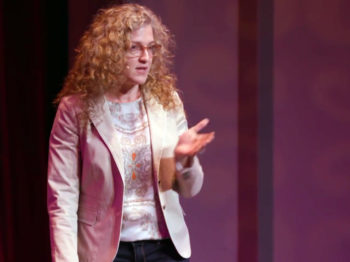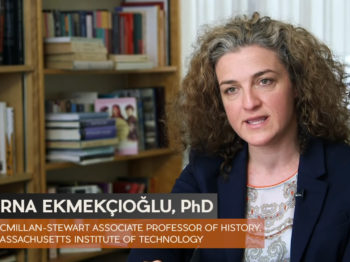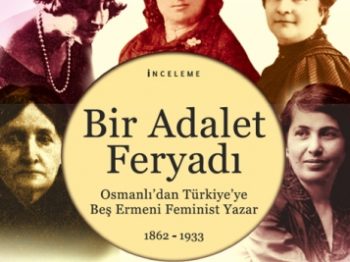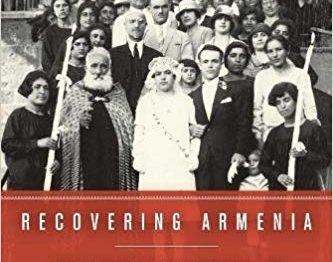
Twelve Faces of Armenian Feminism
2019-21 CAST Mellon Faculty Grant
A project of recovery and reclamation focused on 12 unsung change-makers
About
As a CAST Mellon Faculty Fellow, McMillan-Stewart Associate Professor of History Lerna Ekmekçioğlu is creating a virtual exhibition and digital archive, “Twelve Faces of Armenian Feminism, 1860s to 1960s.” The project, based on research conducted by Ekmekçioğlu and Dr. Melissa Bilal (Visiting Scholar at MIT 2017–18), highlights 12 pioneering Armenian women writers and activists who produced work from the 1860s to 1960s.
Ekmekçioğlu explains, “This is a project of recovery and reclamation. We focus on 12 unsung change-makers—all feminists—in order to restore them to their proper places in history and popular consciousness. These Armenian writers, educators, translators, journalists, editors, and revolutionaries produced discourses and initiated practices that challenged the gendered norms of their times… Their feminism and national consciousness always remained entangled and mutually enforcing.”
The project involves an interactive, multimedia exhibition that showcases a sample of the women’s published and unpublished work, letters, pictures, postcards, and various memorabilia, which Bilal and Ekmekçioğlu unearthed in archives around the world. The online exhibition includes video installations of oral history interviews with some of the women’s descendants and animations of their life stories as well as performances of the women’s poetry set to music and dramatic readings of selected texts.
The virtual exhibition will awaken the histories denied from school textbooks and popular national memory while inspiring viewers to rediscover voices reclaimed through the new wave of feminism in the Armenian homeland and diaspora.
Schedule
Upcoming Events
Virtual Exhibition
Twelve Faces of Armenian Feminism, 1860s to 1960s
Collaborators
Lerna Ekmekçioğlu, McMillan-Stewart Associate Professor of History at MIT, is a historian of the modern Middle East and an affiliate of the MIT Program in Women’s and Gender Studies (WGS) as well as the MIT Center for International Studies. She specializes in 19th- and 20th-century Turkey and Armenia, with a focus on minority-majority relationships and the ways in which gendered analytical lenses help us better understand coexistence and conflict.
Biography: MIT History Department
Melissa Bilal is a Distinguished Research Fellow, Department of Ethnomusicology, University of California, Los Angeles and Visiting Scholar in the MIT History Department (2017–18). Bilal comes from the American University of Armenia, where she is an Assistant Professor in the College of Humanities and Social Sciences. Previously, she held the positions of Visiting Professor of Armenian Studies in NELC at the University of Chicago, Visiting Scholar of History at MIT, Visiting Faculty of Armenian Studies in MESAAS at Columbia University, Visiting Lecturer of History at Boğaziçi University, Postdoctoral Research Fellow at Orient-Institut Istanbul, and Mellon Postdoctoral Teaching Fellow in Music at Columbia University.
Biography: University of California, Los Angeles
Hourig Attarian is Assistant Professor, Program in English and Communications at the American University of Armenia. Attarian obtained her PhD from the Faculty of Education, McGill University. She is also a core member of the Centre for Oral History and Digital Storytelling (COHDS) at Concordia University in Montreal, Canada. Visual arts-based methodologies are a core facet of her research endeavors. Anchored in the blurred genre of life history and autobiographical inquiry, her work focuses on storying memory and identity through visual and narrative explorations. Her research-creation projects draw together difficult memories and marginalized histories of violence within a framework of public pedagogy.
Biography: American University of Armenia
Sevan Injejikian, Curator and PhD candidate, History of Art, University College, London, graduated from Concordia University with a BA in Creative Writing in 2005, and from McGill University with an MA in Art History in 2010. Injejikian’s research examines new media art projects that were produced during and following the 2006 Lebanon War, and how they engage with experiences of conflict in an era of digital “immediacy.”
Biography: University College, London
In the Media
Hetq.am: Confronting Challenges: To Be an Armenian Feminist in Turkey (English)
Agos: Loyalty – Armenian in a deadlock predicament
Mirror-Spectator: Historians in Action: How and Why We Reclaim an Armenian Feminist Past
MIT News: Life in the aftermath, MIT historian’s book explores life for Armenians in modern Turkey
Society for Armenian Studies: Winner of SAS Prizes for 2017








